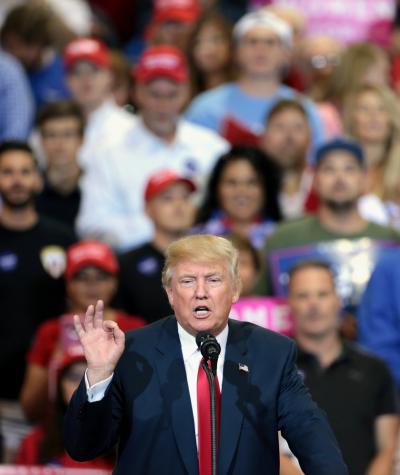In 2018, then-House Speaker Paul Ryan flew to Las Vegas, sat down with mega donor Sheldon Adelson, emphasized the importance of electing Republicans to the House, and then left the room. Minutes later, the head of a Ryan-aligned super PAC, the Congressional Leadership Fund, stepped in to secure a $30 million contribution from Adelson.
What Ryan did was probably legal: the Federal Election Commission (FEC) has allowed candidates to appear at fundraisers for super PACs, and it has even allowed candidates to urge donors to give to super PACs, as long as they limit those solicitations to $5,000.
President Trump was less careful. This week, his campaign put out an official statement that criticized the “dishonest fundraising” practices of certain political groups claiming ties to the President, and told potential donors that there is only “one approved outside non-campaign group”: the super PAC America First Action (AFA)).
The Trump campaign emphasized that AFA, “is run by allies of the President and is a trusted supporter of President Trump’s policies and agendas.”
The campaign, however, didn’t bound its fundraising pitch in any way, instead issuing a blanket endorsement of contributions to the super PAC—which could include unlimited and corporate funds, which would be illegal if given directly to the campaign.
Campaign Legal Center and End Citizens United filed a complaint with the FEC asking it to enforce the law.
In the years since the Supreme Court’s Citizens United decision paved the way for super PACs, politicians have found new ways to work closely with those supposedly independent groups.
It is fair to say that the spirit of the rules designed to protect that independence are routinely undermined, and it is troubling enough that groups are taking the lesson that they can get away with pushing the legal envelope.
But that’s why it is important that the FEC carefully police those rules that are on the books—particularly when the violations are committed by a sophisticated actor in an official statement.
Ultimately, this episode illustrates the fundamental illusion at the heart of our super PAC system.
Super PACs may only raise and spend unlimited amounts if they are independent of the candidates they support. The Supreme Court has insisted that this “independence” is what prevents $30 million contributions to the super PAC from corrupting the candidate. But this theory bears little resemblance to current reality.
The Trump campaign publicly urging donors to give to its “approved” and “trusted” super PAC not only crosses a legal line, it is further evidence that the concept of super PAC independence is a sham.
